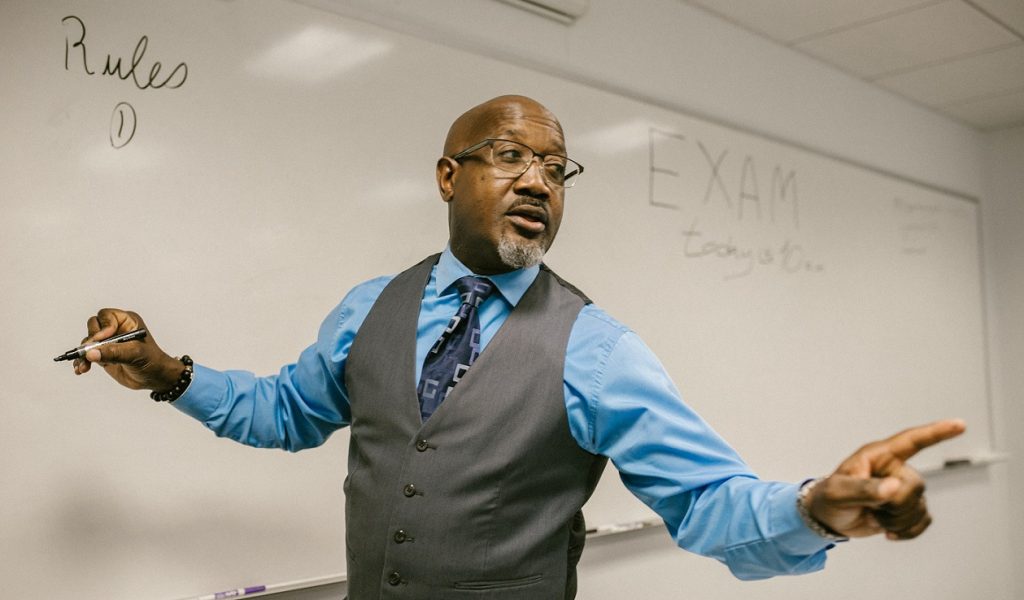Introverts: Surviving as a Quieter Music Educator
They may be rarer in the field, but introverted music teachers do exist — and can thrive professionally.
I think of extroverts and introverts in terms of batteries. True extroverts recharge their energy reserve — their batteries — by interacting with other people. They thrive in the spotlight, on meeting new people, on social engagement.
Extroverts are the ones who must be dragged from a party and who feel no anxiety when they get an invite to a “mix and mingle” networking event. (Whereas I get tense even typing the words “networking event.”)
Introverts like me recharge their batteries with either time spent alone or with one-on-one time with loved ones. This doesn’t mean introverts are shy or unenergetic, but they will come home from an event and think, “Phew!” For introverts, interacting with other people takes exertion, and having periods of time with less stimulation is restorative.
How to Tell If You’re an Introvert
Introversion/extroversion is one of the five main personality traits often called the “Big Five” used in psychology to describe aspects of human personality and to predict behavior. (The rest of the Big Five are openness to experience, conscientiousness, agreeableness and neuroticism.)
According to the U.S. Chamber of Commerce, introverts in the workplace tend to prefer solo projects instead of group projects, enjoy written communication over verbal, and feel tired after being in social settings. Extroverts, in contrast, don’t need much alone time, enjoy group projects and love to be in social situations. Those students you see belting out show tunes by their lockers? Definitely extroverts.
In the past, introverts got a bad rap as being antisocial, but introverts are increasingly understood and valued for their strengths, which include creativity, excellent listening skills and careful decision making — traits that help them in leadership positions. So, you don’t need to fake being an extrovert to succeed. Instead, learn to work with who you really are. As Anne Lamott wrote, “Lighthouses don’t go running all over an island looking for boats to save; they just stand there shining.”
Are Introverted Teachers Unusual?
According to a research study called “Do You Have the Personality for Teaching Music?” by David Synder, DMA, a professor of music education at Illinois State University, extroverts are more common in the music teaching profession. He used the Myers-Briggs Personality Indicator for this research, which looks at people’s preferences in these four areas:
-
-

You prefer to focus on the outer world (E=extraversion) or your own inner world (I=introversion)
- You tend to focus on the basic information you take in (S=sensing) or interpret and add meaning (N=intuition)
- Your initial decision-making is based on logic and consistency (T=thinking) or on people and special circumstances (F=feeling)
- You prefer to get things decided (J=judging) or stay open to new information and options (P=perceiving)
-
There are 16 possible personality types, each expressed as a four-letter code.
Snyder found an “extraordinarily high concentration of ENFJs, a personality type that is extroverted.” However, he writes, “there is a wide range of personalities represented within music teaching and within the teaching professional as whole,” and notes that there are successful educators of all types. If you are an introverted music educator and feel surrounded by extroverted colleagues, it’s not surprising.
Schedule in Quiet Time
By the very nature of their jobs, music educators are called on to expend social energy. Think about work such as teaching one-on-one instrument lessons, standing in front of a classroom or directing a choir. Then there are the staff meetings, open houses and district trainings. That’s a lot of output for an introvert.
It’s important to schedule in some downtime during your day with activities like taking a walk or reading alone in a quiet spot. These restful moments will help you feel recharged and ready for the next social interaction. Some introverts even find that teaching at smaller schools is a better fit for them, with fewer students per class and less crowded classrooms.
Make Mindful Choices
Another key for introverts: Don’t overcommit. When opportunities arise to chaperone the senior-class trip to a ropes course, make sure it aligns with your needs. Introverts may do better with more behind-the-scenes roles, such as designing flyers for that class trip or helping with trip registrations. And because introverts need time to process information, try to avoid knee-jerk “yes” or “no” responses — try “let me check and get back to you.”
Resources for Introverted Music Educators
Here are some ideas for developing your music education career, while nurturing your inner introvert:
- Take the quiz, “Are You an Introvert Teacher?,” which provides actionable tips for introverted teachers, such as having plenty of student-led lessons, planning school activities through communication platforms like Google Meets instead of in-person committee meetings, and eating lunch once a week alone to give yourself a break from other humans.
- In her blog “The Introvert’s Guide to Leadership Presence,” author and speaker Susan Cain shares how to use eye contact, vocal resonance, gestures and movement in strategic ways to project leadership while staying true to your introverted personality. Cain is considered an expert in this field and wrote the oft-quoted book “Quiet: The Power of Introverts in a World That Can’t Stop Talking.”
- Introvert, Dear is an online community devoted to introverts’ needs, with resources on how to handle relationships, careers, parenting and even concert-going as an introvert.
- Do you have introverted students who need support? Check out the scholarly paper “Introversion and Social Engagement,” published in “Frontiers in Psychology,” 2020, for deeper understanding of how to help them thrive.
- “The Introverted Leader: Building on Your Quiet Strength” by Jennifer B. Kahnweiler, Ph.D. has tips for succeeding in an extroverted workplace, as well as creating workplaces that are more friendly to introverts.
As for me? I’m going to go savor some alone time now, thanks.
















